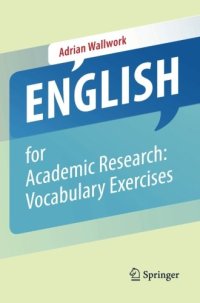
Ebook: English for Academic Research: Vocabulary Exercises
Author: Adrian Wallwork
This book is based on a study of referees' reports and letters from journal editors on reasons why papers written by non-native researchers are rejected due to problems with English (long sentences, redundancy, poor structure etc). It draws on English-related errors from around 5000 papers written by non-native authors, around 3000 emails, 500 abstracts by PhD students, and over 1000 hours of teaching researchers how to write and present research papers. The exercises are organized into nine chapters on: adjectives and adverbs (e.g. actual vs current, different vs several, continually vs continuously), link words (e.g. on the contrary vs on the other hand, despite vs nevertheless), nouns (e.g. danger vs hazard, measure vs measurement), prepositions (e.g. among vs between, in vs into, with vs within), verbs (e.g. check vs control, compose vs comprise, arise vs raise, exclude vs rule out), false friends and synonyms, spelling, useful phrases, emails Nearly all exercises require no actual writing but simply choosing between various options, thus facilitating self-study, e-reading and rapid progress. The exercises can also be integrated into English for Academic Purposes (EAP) and English for Special Purposes (ESP) courses at universities and research institutes. The book can be used in conjunction with the other exercise books in the series: English for Academic Research: Writing Exercises English for Academic Research: Grammar Exercises
This book is based on a study of referees' reports and letters from journal editors on reasons why papers written by non-native researchers are rejected due to problems with English grammar. It draws on English-related errors from around 5000 papers written by non-native authors, several hundred emails, 500 abstracts by PhD students, and over 1000 hours of teaching researchers how to write and present research papers. The exercises include the following areas: active vs passive, use of wearticles (a/an, the, zero) and quantifiers (some, any, few etc)conditionals and modalscountable and uncountable nounsgenitiveinfinitive vs -ing formnumbers, acronyms, abbreviationsrelative clauses and which vs thattenses (e.g. simple present, simple past, present perfect)word orderExercise types are repeated for different contexts. For example, the difference between the simple present, present perfect and simple past is tested for use in papers, referees' reports, and emails of various types. Such repetition of similar types of exercises is perfect for revision purposes. English for Academic Research: Grammar Exercises is designed for self-study and there is a key to all exercises. Most exercises require no actual writing but simply choosing between various options, thus facilitating e-reading and rapid progress. The exercises can also be integrated into English for Academic Purposes (EAP) and English for Special Purposes (ESP) courses at universities and research institutes.The book can be used in conjunction with the other exercise books in the series and is cross-referenced to: English for Research: Usage, Style, and GrammarEnglish for Writing Research PapersEnglish for Academic Correspondence and Socializing Adrian Wallwork is the author of around 30 ELT and EAP textbooks. He has trained several thousand PhD students from 35 countries to write and present academic work.English for Writing Research PapersEnglish for Academic Correspondence and Socializing Adrian Wallwork is the author of around 30 ELT and EAP textbooks. He has trained several thousand PhD students from 35 countries to write and present academic work.English for Academic Correspondence and Socializing Adrian Wallwork is the author of around 30 ELT and EAP textbooks. He has trained several thousand PhD students from 35 countries to write and present academic work.
This book is based on a study of referees' reports and letters from journal editors on reasons why papers written by non-native researchers are rejected due to problems with English grammar. It draws on English-related errors from around 5000 papers written by non-native authors, several hundred emails, 500 abstracts by PhD students, and over 1000 hours of teaching researchers how to write and present research papers. The exercises include the following areas: active vs passive, use of wearticles (a/an, the, zero) and quantifiers (some, any, few etc)conditionals and modalscountable and uncountable nounsgenitiveinfinitive vs -ing formnumbers, acronyms, abbreviationsrelative clauses and which vs thattenses (e.g. simple present, simple past, present perfect)word orderExercise types are repeated for different contexts. For example, the difference between the simple present, present perfect and simple past is tested for use in papers, referees' reports, and emails of various types. Such repetition of similar types of exercises is perfect for revision purposes. English for Academic Research: Grammar Exercises is designed for self-study and there is a key to all exercises. Most exercises require no actual writing but simply choosing between various options, thus facilitating e-reading and rapid progress. The exercises can also be integrated into English for Academic Purposes (EAP) and English for Special Purposes (ESP) courses at universities and research institutes.The book can be used in conjunction with the other exercise books in the series and is cross-referenced to: English for Research: Usage, Style, and GrammarEnglish for Writing Research PapersEnglish for Academic Correspondence and Socializing Adrian Wallwork is the author of around 30 ELT and EAP textbooks. He has trained several thousand PhD students from 35 countries to write and present academic work.English for Writing Research PapersEnglish for Academic Correspondence and Socializing Adrian Wallwork is the author of around 30 ELT and EAP textbooks. He has trained several thousand PhD students from 35 countries to write and present academic work.English for Academic Correspondence and Socializing Adrian Wallwork is the author of around 30 ELT and EAP textbooks. He has trained several thousand PhD students from 35 countries to write and present academic work.
Download the book English for Academic Research: Vocabulary Exercises for free or read online
Continue reading on any device:

Last viewed books
Related books
{related-news}
Comments (0)